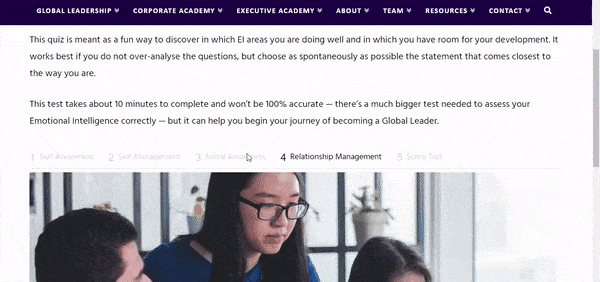Can you be a successful global leader without having “people skills”?
This question is actually easily answered: No. You definitely need people skills, also known as interpersonal competencies, to be a successful global leader. And good ones at that.
We know this is tricky. Some people are born with an innate interpersonal competence that allows them to easily make friends and influence people, while others struggle to build and maintain meaningful relationships. So perhaps the more intriguing question is: Can you develop interpersonal skills to become a successful global leader?
To that, we say yes — as long as you’re willing to work on yourself. So let’s dive into the details of interpersonal competencies, why they’re so important, and how you can assess and develop them to become a successful global leader.
Interpersonal Competencies of Global Leaders
First off, let’s be clear on the definition of interpersonal skills, also known as social competencies or more colloquially as people skills. For most people, interpersonal competence means the following:
Interpersonal competence is the ability to interact with others and with the community. This includes the ability to build and maintain healthy relationships that are mutually beneficial, and the capacity for interdependence and collaboration.
This is the basic set of skills any leader needs to successfully interact and communicate with their team. They include:
- Active listening
- Teamwork
- Responsibility
- Dependability
- Patience
- Flexibility
- Motivation
- Empathy
Global leaders must go beyond this basic level of interpersonal skills to effectively lead their team. Because global leadership goes beyond domestic, expatriate, and comparative leadership, as well as global management or simply a global title, and becomes “extreme leadership”.
Yes, kind of like extreme sports. And like an extreme athlete who needs that higher level of resilience, endurance, willpower, fitness and courage to push themselves to the absolute limit, so must global leaders take their competencies — whether interpersonal or otherwise — to a higher level.
So let’s take a look at what further skills a global leader needs to demonstrate all necessary interpersonal competencies for successful global leadership.

Emotional Intelligence (EI)
Emotional intelligence is success factor number one for global leaders — and the foundation of anyone’s interpersonal skills.
Emotional intelligence allows you to
- self-regulate,
- make positive choices about how you interact with others,
- think before you act,
- increase empathy and altruism, and
- build high-quality connections.
Without the ability to accurately perceive your own and other’s emotions, understand the signals emotions communicate between people, and manage your own and others’ emotions, your people skills will be sorely lacking, and the following necessary competencies for global leaders non-existent. See how skilled you are by taking the Emotional Intelligence Test:
Valuing People
No man is an island.
John Donne
Whether you’re leading a company, a charity organization, or a political movement — people are your most valuable asset. Without people, there is nobody to lead. And people who don’t feel valued by their leaders won’t want to be lead by them.
Successful global leaders value and respect people and their opinions. Not just team members or their followers; a good global leader also values people with opposing views and opinions. They offer a chance to learn and grow, and understanding them brings global leaders closer to winning them over to their side.
So how do global leaders show that they value the people around them?
Being respectful
Global leaders show respect to everyone they interact with. They understand that everyone has their own life experiences, their own battles to fight, their own valid opinions, even if they differ from others. Global leaders aren’t afraid of “different”, but rather intrigued by it, and are able to see it as a worthy challenge or food for thought. This mindset allows good global leaders to treat everyone, even the opposition, with respect — thereby earning other people’s respect in return.
Expressing appreciation and recognition
Few things are more motivating than the person you look up to, the person leading you, expressing their appreciation and gratitude for a job well done. Global leaders know this and are happy and eager to show recognition on a personal and specific level.
Being honest and transparent
Truthful and transparent feedback and open communication can be difficult at times, but global leaders understand that talking about bad news is a better policy than burying it. In the end, honest and open conversations gain respect and garner the best possible results.

Empowering Others
Empowering people goes hand in hand with valuing them, but takes that value one step further. Global leaders don’t simply respect others, are not just open about their appreciation for them, and don’t stop at honesty and transparency.
Rather, global leaders understand that delegating tasks, handing over the project reins, and actively supporting people in their personal- and career development, motivates and inspires them to step out of their comfort zones and grow.
Showing trust
Like respect, trust goes both ways. People are more inclined to trust someone who trusts them first. Global leaders take that leap by trusting people until proven otherwise, which sends an important message: You’ve got this, you don’t need me looking over your shoulder, but I know you’ve got my back, too.
Mentoring
Global leaders also act as mentors for people around them. Of course they don’t have the time or opportunity to mentor everyone they cross paths with; but they generally want people to grow and succeed, and are happy to share the knowledge and wisdom they’ve gained where they can.
Creating opportunities
Good global leaders create opportunities for the people around them to grow and succeed. They might, for example, let them take on new challenges and give them ownership in the form of a high-visibility project or leadership role, pay for workshops and conferences, or introduce them to other leaders and influencers.
Teaming Skills
Not to be confused with teamwork, teaming is the activity of “actively building and developing teams even as a project is in progress, while realizing that a team’s composition may change any time. Teaming is essential to organizational learning”.
Teams aren’t the static group of individuals that many models make them out to be (outside of sports teams or musical groups). Teaming requires the development of cognitive (thinking) as well as affective (feeling) skills to expand knowledge and expertise.
In this context, global leaders need teaming skills like
- Flexibility and presence of mind to act quickly upon potential collaborations presenting themselves
- Asking the right questions at the right time
- Gaining trust quickly
- Communicating effectively
- Building relationships quickly
- Time Management
- Problem Solving
Successful global leaders understand that teaming is a dynamic activity, determined by the mindset and practices of teamwork, not by the design and structures of effective teams. Teams must be able to coordinate and collaborate without the benefit of stable team structures, because many organisations like hospitals or power plants require a high level of flexibility that makes stable team structures difficult and rare.

Assessing Interpersonal Competencies for Global Leaders
Few things are as difficult to define and assess as interpersonal competencies. As a soft skill, they are challenging to quantify. Evaluating them is a subjective process, which makes them difficult to convert into measurable development steps.
Many people also have a hard time being completely honest about their weaknesses, or might not even be aware of them, which makes understanding your interpersonal competence (or lack thereof) difficult.
But knowledge is half the victory. Once you know which interpersonal competencies you’re lacking as a global leader, you can work to improve them.
Here’s an overview of ways to assess your interpersonal competencies:
- Understand your personality type by taking personality tests like Myers-Briggs. Just the awareness of where your personality tends to have strengths and weaknesses can point you in the right direction.
- Take the Global Emotional Intelligence Test (GEIT) to determine your emotional intelligence.
- Take interactive online quizzes and questionnaires like this one or this one to assess your interpersonal skill level.
- Ask for feedback specific to your interpersonal competencies during performance reviews with your boss and be open to discuss them.
- Gather honest feedback about your people skills from as many different people in your life as possible; your colleagues, employees, superiors, spouse, friends, relatives – any- and everybody who is part of your circle.

Developing Interpersonal Competencies for Global Leaders
Once you know what areas need improvement, you can start raising your interpersonal competencies to a higher level. Here are several different ways to start, depending on what you need to improve.
Improve Communication Skills
As we’ve mentioned before, communication is key to great interpersonal skills. Without communication, all your best intentions fall flat and your message won’t be heard. Here’s a list of things to do to improve your communication skills:
- Assess your audience, choose an appropriate channel to reach them, and monitor the effectiveness of your message
- Ask the right questions
- Find common ground with your audience
- Use powers of negotiation and persuasion to present your case
- Use rhetoric to construct a persuasive argument
- Listen carefully to the response to your message (Active Listening)
Learn to Manage Differences
Conflict arises in any team. Unresolved, it can be damaging and disruptive, affecting morale and productivity to the point where team members may disengage from the team or leave entirely.
On the other hand, conflict is a good indicator of underlying issues, offering the chance to analyze, understand and deal with them, which can prevent similar situations from popping up in the future.
There are several approaches to conflict resolution:
- Bell and Hart’s Eight Causes of Conflict helps identify the source of an issue, the causes of which range from insufficient resourcing and confused roles to incompatible values and unpredictable policies.
- The Interest-Based Relational (IBR) Approach recommends separating problems from people. Issues must be examined and discussed objectively to not damage the relationship.
- The Perceptual Positions exercise helps you see other people’s points of view by picturing the situation from different perspectives.
Maintain Personal Integrity
A person’s ability to stand up for what they believe in, i.e. their personal integrity, is the foundation of their interpersonal competence. It allows them to make choices and decisions in dealing with others by using their personal values as benchmark.
Knowing and acting on their core values will always keep them on the right track through all their interactions with other people, and serve as a guide in challenging situations. Personal integrity is especially important for leaders of any kind, as people won’t follow someone who doesn’t have it in a fully committed and inspired manner.
Learn More About Interpersonal Competencies for Global Leaders with eurac
There are more ways to both assess and develop a global leader’s interpersonal competencies — but going into them all is beyond the scope of this article. As part of our global leadership development program, eurac provides both global leadership competencies assessment and analysis, as well as then consulting, coaching and training executives to be successful global leaders.
Click here for more information on how we develop global leaders for multi-national corporations, or sign up for our weekly newsletter to learn more about global leadership.


